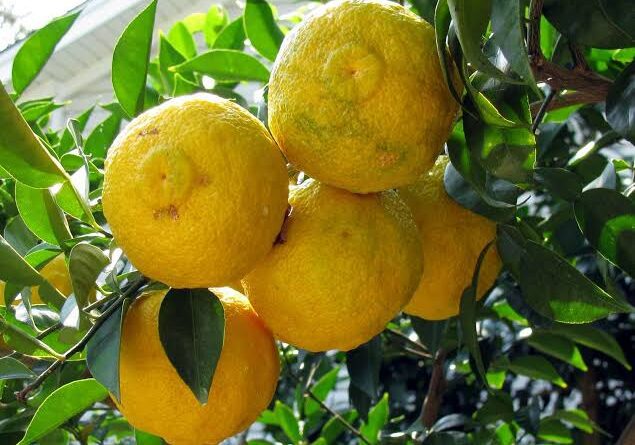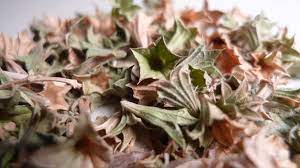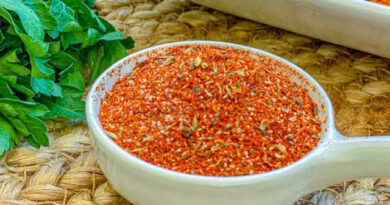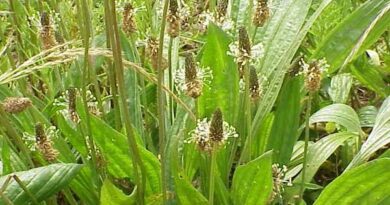23 Medicinal Health Benefits of Citrus latipes (Khasi Papeda)
Citrus latipes, commonly known as Khasi Papeda, is a lesser-known citrus fruit with a rich history and a treasure trove of medicinal health benefits. In this article, we will explore the fascinating botanical description of Citrus latipes and delve into its numerous medicinal properties that have made it a valuable addition to traditional medicine.
The Botanical Description of Citrus latipes
Understanding the botanical characteristics of Citrus latipes is crucial for appreciating its uniqueness and its potential contributions to health and wellness. Here’s a detailed look at the botanical description of this remarkable citrus fruit:
1. Life: Citrus latipes is an evergreen tree, which means it retains its green foliage throughout the year.
2. Size: These trees are relatively small, typically reaching heights of 4 to 8 meters (13 to 26 feet). They have a bushy and compact appearance.
3. Leaves: The leaves of Citrus latipes are glossy, dark green, and elliptical in shape. They are arranged alternately along the branches and exude a pleasant citrus fragrance when crushed.
4. Flowers: The flowers of Citrus latipes are fragrant and white, often occurring singly or in small clusters. They have the characteristic five-petal structure common to many citrus species.
5. Fruits: The fruit of Citrus latipes is round or slightly oval, typically measuring 5 to 7 centimeters (2 to 3 inches) in diameter. They have a distinctive green or yellowish-green color, often with a bumpy or pebbled texture on the skin.
6. Skin and Pulp: The skin of Citrus latipes fruits is thick and rough, while the pulp inside is juicy and filled with small, edible seeds. The pulp has a unique flavor profile, combining a sour and bitter taste with underlying sweetness.
7. Growth Habit: Citrus latipes trees have a bushy growth habit and are known for their tolerance to various environmental conditions.
8. Native Range: This citrus species is native to Southeast Asia, specifically the Khasi Hills region of northeastern India, from which it derives its common name, Khasi Papeda.
The Geographic Distribution of Citrus latipes (Khasi Papeda)
Understanding the geographic distribution of Citrus latipes is essential to appreciate where this unique citrus species can be found. Let’s explore the regions where Citrus latipes thrives:
1. Native Habitat: Citrus latipes is indigenous to the Khasi Hills region of northeastern India. This region, characterized by its hilly terrain and humid climate, provides the natural habitat for this citrus species.
2. Southeast Asia: Beyond its native habitat, Citrus latipes can also be found in various parts of Southeast Asia, including neighboring countries like Myanmar and Thailand.
3. Cultivation: Due to its adaptability, Citrus latipes has been cultivated in other regions of the world with suitable climates, including parts of tropical and subtropical Asia.
4. Greenhouse Cultivation: In some cases, Citrus latipes is grown in controlled environments such as greenhouses, allowing it to thrive outside of its native range.
5. Limited Global Distribution: It’s important to note that Citrus latipes is not as widely distributed as some other citrus species. Its cultivation and presence are more concentrated in specific areas.
The Chemical Composition of Citrus latipes (Khasi Papeda)
The chemical composition of Citrus latipes plays a significant role in its flavor, aroma, and potential medicinal properties. Let’s explore the key components that make up this unique citrus species:
1. Vitamin C: Citrus latipes is a rich source of vitamin C (ascorbic acid), a powerful antioxidant that supports immune function, skin health, and overall well-being.
2. Essential Oils: Like many citrus fruits, Citrus latipes contains essential oils in its peel. These oils contribute to its distinctive aroma and flavor.
3. Flavonoids: Flavonoids are naturally occurring compounds found in Citrus latipes that have antioxidant and anti-inflammatory properties, contributing to its potential health benefits.
4. Phytochemicals: Citrus latipes contains various phytochemicals, including limonin and nomilin, which have been studied for their potential anticancer properties.
5. Fiber: The pulp of Citrus latipes contains dietary fiber, which aids in digestion, promotes a feeling of fullness, and supports gastrointestinal health.
6. Bitter Compounds: Citrus latipes is known for its bitter taste, which is attributed to compounds like limonin and nomilin. These compounds may have digestive benefits.
7. Citrus Bioflavonoids: This citrus species contains a range of bioflavonoids, which have antioxidant and anti-inflammatory properties and may contribute to cardiovascular health.
8. Water Content: Like most fruits, Citrus latipes has a high water content, which helps keep the body hydrated when consumed.
9. Organic Acids: Citrus latipes contains organic acids, such as citric acid, which contribute to its tart flavor and can play a role in various metabolic processes in the body.
The Harvesting and Processing of Citrus latipes (Khasi Papeda)
The harvesting and processing of Citrus latipes are essential steps to ensure the fruit reaches consumers in its optimal condition. Let’s explore the typical methods involved in harvesting and processing Citrus latipes:
1. Harvesting: Citrus latipes fruits are usually harvested when they reach the desired level of ripeness. This is typically determined by the fruit’s color and firmness. Handpicking is the most common method to avoid damaging the fruit.
2. Post-Harvest Handling: After harvesting, the fruits are carefully sorted to remove damaged or overripe ones. This ensures that only high-quality fruits proceed to the processing stage.
3. Washing and Cleaning: The harvested Citrus latipes fruits undergo thorough washing and cleaning to remove any dirt or contaminants that may have adhered to the skin.
4. Extraction of Essential Oils: The peel of Citrus latipes is rich in essential oils. These oils can be extracted through various methods, such as cold pressing, steam distillation, or solvent extraction.
5. Juice Extraction: Some Citrus latipes fruits are processed to extract their juice, which can be consumed directly or used in various food and beverage products.
6. Packaging: Once processed, the extracted essential oils or juice are packaged in suitable containers for distribution and sale. Packaging materials should be chosen to maintain the quality and freshness of the product.
7. By-Products: The by-products of Citrus latipes processing, such as peels and seeds, can be used for various purposes, including the production of animal feed, essential oil extraction, or composting.
8. Quality Control: Throughout the harvesting and processing stages, quality control measures are crucial to ensure that the final products meet safety and quality standards. Testing for contaminants and maintaining hygiene is essential.
Read Also: 22 Medicinal Health Benefits Of Balanites Roxburghii (Hingot)
The Medicinal Health Benefits of Citrus latipes (Khasi Papeda)

Citrus latipes, commonly known as Khasi Papeda, is not only a unique citrus fruit but also a source of various medicinal health benefits. Here, we explore 23 of its remarkable medicinal properties:
1. Immune Boost: Citrus latipes is rich in vitamin C, which supports the immune system, helping the body fend off infections.
2. Antioxidant Power: Its high antioxidant content helps combat free radicals, reducing the risk of chronic diseases.
3. Digestive Aid: Khasi Papeda’s bitter and sour taste stimulates digestive enzymes, aiding digestion and relieving indigestion.
4. Weight Management: The fiber in Citrus latipes promotes satiety, potentially aiding in weight management.
5. Respiratory Health: It can alleviate respiratory symptoms like coughs and colds due to its expectorant properties.
6. Skin Health: Topical applications may help with skin issues like acne and infections, thanks to its antibacterial properties.
7. Blood Pressure Regulation: Some studies suggest Citrus latipes may contribute to regulating blood pressure, promoting heart health.
8. Anti-Inflammatory Effects: Compounds in Citrus latipes may possess anti-inflammatory properties, beneficial for various inflammatory conditions.
9. Detoxification: It aids detoxification by supporting liver function and eliminating toxins from the body.
10. Allergy Relief: Consumption of Citrus latipes may provide relief from allergies and allergic reactions.
11. Oral Health: Citrus latipes’ natural acidity can help combat oral bacteria, promoting dental health.
12. Cancer Prevention: Some phytochemicals found in Citrus latipes, like limonin, have been studied for their potential anticancer effects.
13. Diabetes Management: Preliminary research suggests it may help regulate blood sugar levels in individuals with diabetes.
14. Cardiovascular Health: Regular consumption may reduce the risk of cardiovascular diseases due to its heart-healthy properties.
15. Anti-aging: The antioxidants in Citrus latipes can slow down the aging process by combating oxidative stress.
16. Liver Health: It supports liver health by aiding detoxification and promoting healthy liver function.
17. Menstrual Relief: For some women, Citrus latipes may alleviate menstrual discomfort and cramps.
18. Bone Health: The presence of vitamins and minerals supports overall bone health.
19. Antimicrobial: It exhibits antimicrobial properties, potentially helping to fight infections.
20. Vision Support: The vitamin A content contributes to good vision and eye health.
21. Anti-Anxiety: Citrus latipes’ aroma may have a calming effect, reducing anxiety and stress.
22. Hair Health: Topical use can strengthen hair and improve scalp health.
23. Wound Healing: Citrus latipes extracts may promote faster wound healing when applied topically.
The Methods of Usage to Achieve the Provided Health Benefits of Citrus latipes (Khasi Papeda)
To harness the medicinal health benefits of Citrus latipes, various methods of usage can be employed. Here are the most common methods and how they achieve health benefits:
1. Fresh Consumption: Eating the fresh fruit provides vitamins, antioxidants, and fiber, supporting overall health.
2. Juice: Extracting juice from Citrus latipes offers a concentrated source of nutrients and antioxidants, supporting immunity and digestion.
3. Essential Oils: Topical application of essential oils extracted from Citrus latipes can address skin issues and provide stress relief through aromatherapy.
4. Tea: Preparing tea from the leaves or dried peel can aid digestion, soothe respiratory issues, and provide relaxation.
5. Culinary Use: Including Citrus latipes in recipes adds flavor and nutritional value to dishes, enhancing overall wellness.
6. Infusions: Creating infusions by steeping the peel or leaves in hot water can extract beneficial compounds for consumption.
7. Skin Care Products: Citrus latipes extracts are used in skincare products like creams and serums for their antibacterial and antioxidant properties.
8. Dietary Supplements: Capsules or tablets containing Citrus latipes extracts provide a convenient way to access its health benefits.
9. Aromatherapy: Inhaling the aroma of Citrus latipes essential oils can promote relaxation and reduce anxiety.
The Side Effects of Using Citrus latipes Medicinal Plant
While Citrus latipes offers numerous health benefits, it’s important to be aware of potential side effects:
1. Allergic Reactions: Some individuals may experience allergic reactions to citrus fruits, including Citrus latipes.
2. Dental Erosion: The natural acidity of Citrus latipes can erode tooth enamel, so it’s advisable to rinse your mouth after consumption.
3. Gastroesophageal Reflux: Citrus fruits can trigger acid reflux symptoms in some individuals.
4. Skin Sensitivity: Citrus latipes extracts can make the skin more sensitive to sunlight, increasing the risk of sunburn.
5. Stomach Irritation: Excessive consumption can lead to stomach upset, including heartburn and gastrointestinal discomfort.
6. Interaction with Medications: Citrus latipes may interact with certain medications, affecting their effectiveness.
7. Dental Issues: The high acid content can contribute to dental problems like cavities and enamel erosion.
8. Weight Gain: While the fiber can aid weight management, excessive consumption may lead to weight gain due to calorie intake.
9. Blood Sugar Spikes: Individuals with diabetes should monitor their blood sugar levels, as Citrus latipes may affect them.
10. Lip Blisters: Some people may develop lip blisters or cold sores after consuming citrus fruits.
11. Oral Allergy Syndrome: Individuals with pollen allergies may experience cross-reactivity when consuming Citrus latipes.
12. Skin Irritation: Applying Citrus latipes extracts directly to the skin can cause irritation in some individuals.
13. Digestive Discomfort: Overconsumption may lead to digestive discomfort, including diarrhea.
14. Interaction with Medications: Citrus latipes can interact with medications like statins and calcium channel blockers, affecting their absorption and effectiveness.
15. Photosensitivity: Skin exposed to Citrus latipes oil can become more sensitive to sunlight, increasing the risk of sunburn.
Read Also: 20 Medicinal Health Benefits of Galega Officinalis (Goat’s Rue)
The Scientific Research and Studies of Citrus latipes (Khasi Papeda)

Scientific research and studies on Citrus latipes, also known as Khasi Papeda, have unveiled various aspects of this unique citrus fruit. Here are 18 key findings from scientific investigations:
1. Antioxidant Activity: Research has confirmed the strong antioxidant properties of Citrus latipes, making it a potential ally in combating oxidative stress.
2. Phytochemical Analysis: Studies have identified a range of phytochemicals in Citrus latipes, including flavonoids and limonoids, contributing to its health benefits.
3. Antibacterial Effects: Citrus latipes extracts have exhibited antibacterial activity against various pathogenic bacteria.
4. Antifungal Properties: Research suggests that Citrus latipes may have antifungal effects, making it valuable for addressing fungal infections.
5. Anticancer Potential: Some limonoids found in Citrus latipes have been investigated for their potential in preventing and treating cancer.
6. Gastrointestinal Health: Citrus latipes has been studied for its role in promoting gastrointestinal health and alleviating digestive issues.
7. Cardiovascular Benefits: Research indicates that regular consumption of Citrus latipes may have a positive impact on cardiovascular health.
8. Anti-Inflammatory Effects: Compounds in Citrus latipes have shown promise in reducing inflammation, potentially beneficial for inflammatory conditions.
9. Wound Healing: Topical applications of Citrus latipes extracts have been studied for their potential to accelerate wound healing.
10. Diabetes Management: Preliminary research suggests that Citrus latipes may help regulate blood sugar levels, making it relevant for diabetes management.
11. Antidepressant Properties: Aroma compounds in Citrus latipes essential oil may have mood-enhancing effects.
12. Antimicrobial Activity: Citrus latipes has demonstrated antimicrobial properties, which can be beneficial for combating infections.
13. Antiviral Potential: Some studies have explored the antiviral properties of Citrus latipes against certain viruses.
14. Skin Protection: Citrus latipes extracts have been examined for their potential to protect the skin from UV radiation and oxidative damage.
15. Lipid-Lowering Effects: Research suggests that Citrus latipes may help lower lipid levels in the bloodstream, contributing to lipid management.
16. Anti-Hypertensive Effects: Citrus latipes has been investigated for its role in regulating blood pressure.
17. Hepatoprotective Properties: Studies have shown that Citrus latipes may have protective effects on the liver.
18. Neuroprotective Potential: Some compounds in Citrus latipes have been explored for their neuroprotective properties, potentially relevant for brain health.
The Safety Precautions and Recommendations in Using Citrus latipes (Khasi Papeda) Medicinal Plant
While Citrus latipes offers numerous health benefits, it’s essential to use it safely. Here are safety precautions and recommendations:
1. Allergy Check: Be aware of potential citrus allergies, and if you have a history of citrus allergies, consult a healthcare professional before use.
2. Dental Care: Due to its acidity, rinse your mouth after consuming Citrus latipes to protect tooth enamel.
3. Moderation: Consume Citrus latipes in moderation to avoid digestive discomfort and potential side effects.
4. Medication Interaction: If you’re on medication, consult a healthcare provider, as Citrus latipes may interact with certain drugs.
5. Photosensitivity: Avoid applying Citrus latipes oil to the skin before sun exposure, as it can increase photosensitivity.
6. Dietary Variety: Include a variety of foods in your diet rather than relying solely on Citrus latipes for nutritional benefits.
7. Skin Patch Test: Before using Citrus latipes extracts on the skin, perform a patch test to check for any adverse reactions.
8. Storage: Store Citrus latipes fruits and products in a cool, dry place away from direct sunlight to maintain freshness.
9. Hydration: Ensure adequate water intake when consuming Citrus latipes to prevent dehydration.
10. Pregnancy and Nursing: Pregnant and nursing individuals should consult a healthcare provider before using Citrus latipes products.
11. Sun Protection: When using Citrus latipes essential oil topically, use sunscreen to protect your skin from UV rays.
12. Children: Be cautious when introducing Citrus latipes to children’s diets, as they may have different tolerance levels.
13. Quality Control: Purchase Citrus latipes products from reputable sources to ensure quality and safety.
14. Topical Dilution: Dilute Citrus latipes essential oil with a carrier oil before applying it to the skin to prevent irritation.
15. Individual Sensitivity: Pay attention to your body’s response to Citrus latipes and adjust usage accordingly if you experience any adverse effects.
FAQs About Citrus latipes (Khasi Papeda) Medicinal Plant
1. Is Citrus latipes the same as regular citrus fruits like oranges and lemons?
No, Citrus latipes is a unique citrus species with distinct characteristics and flavors.
2. Can Citrus latipes be grown outside its native regions?
Yes, Citrus latipes can be cultivated in regions with suitable climates, including tropical and subtropical areas.
3. Are there any specific recipes that use Citrus latipes?
Citrus latipes can be used in various culinary dishes, similar to other citrus fruits, to add flavor and nutritional value.
4. Can Citrus latipes essential oil be used for aromatherapy?
Yes, Citrus latipes essential oil can be used in aromatherapy for its potential mood-enhancing effects.
5. Are there any known drug interactions with Citrus latipes?
Citrus latipes may interact with certain medications, so it’s advisable to consult a healthcare provider if you’re on prescription drugs.
6. Can Citrus latipes be used for skincare?
Yes, Citrus latipes extracts are used in skincare products for their antibacterial and antioxidant properties.
7. Is it safe for pregnant women to consume Citrus latipes?
Pregnant individuals should consult a healthcare provider before consuming Citrus latipes products to ensure safety.
8. Can Citrus latipes help with weight management?
The fiber content in Citrus latipes can aid in weight management by promoting a feeling of fullness.
9. Is Citrus latipes safe for children?
Exercise caution when introducing Citrus latipes to children’s diets, as they may have different tolerance levels.
10. How should Citrus latipes products be stored to maintain freshness?
Store Citrus latipes fruits and products in a cool, dry place away from direct sunlight to maintain their freshness and quality.
Read Also: Definition of Savings









